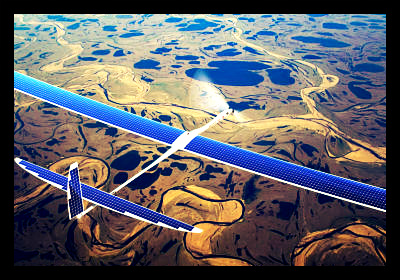Facebook Sends Drones to Africa

When you think of robot drones, what is the first image or information that comes to mind? If you are like me, your brain probably imagined military drones patrolling the Middle East, gathering intelligence and firing missiles. This type of drone has become popular thanks to our recent military engagements and the push by drone manufacturers to utilize them for domestic law enforcement purposes.
Let us put these images of militarized drones aside and come back to a happy place where instruments are used for peace. This is precisely what U.S. technology companies are trying to do with their investments in drone manufacturers. Google made headlines when it announced its new adventure, Project Loon, which seeks to provide internet and network capabilities using balloons in the stratosphere.
Not to be outdone, Facebook, Inc. has plans to buy a drone manufacturer in hopes to use the high altitude crafts to send network signals to communities across the African continent. With two- thirds of the planet currently without internet, technology companies are now racing to conquer these untapped markets.
Facebook’s effort is a part of a larger project called Internet.org. Founded by Ericsson, Mediatek, Opera Software, Nokia, Qualcomm, Samsung and Facebook, the group believes in bringing internet to every person throughout the planet. The group, moreover, feels this is too much responsibility and too important a goal for one company or government to achieve alone.
Utilizing Facebook’s Connectivity Lab, groups of scientists and engineers are designing drone satellites that can fly over remote areas and send network signals to the people living there. Cruising at about 65,000 feet, Facebook estimates that a satellite-equipped drone can provide signal to a city-sized area of territory with a medium population density. Furthermore, solar panels will allow the drone to store energy during the day and use its batteries during the night.
Although this project is in its early stages, companies such as Facebook and Google are providing hope for the millions across the globe still stuck in poverty. A study by Deloitte illustrates the potential and value for internet connectivity. Out of the 4.7 billion people currently living without internet, a majority are in poor and many disadvantaged regions. The report estimates that economic activity as a result new internet connectivity could generate $2.2 trillion in additional GDP and 140 million new jobs.
The benefits of spreading internet technology around the globe are too great to pass up. While most governments are stuck in a state of austerity and can’t spend on research and development, private industry and non-governmental organizations are picking up the slack. With time and greater investment of resources, the world is poised to become more connected than ever.
– Sunny Bhatt
Sources: Internet.org, Deloitte, Business Insider
Photo: Liberty Beat
